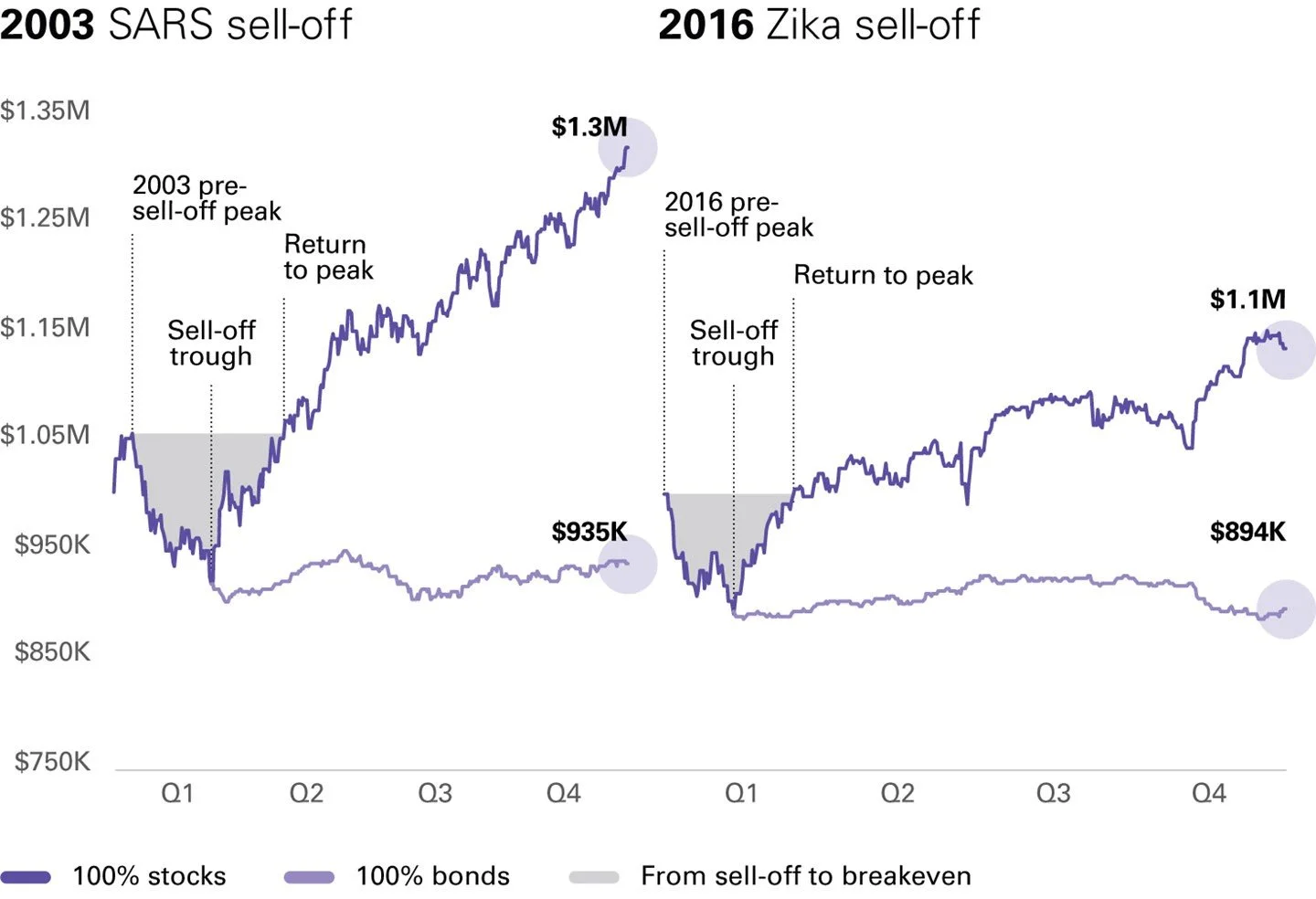WHAT TO DO NOW
The fear of the coronavirus is getting a lot of headline news and impacting markets globally. I don’t want to pander to the fear but rather mention potential opportunities and illustrate information to keep in mind with all that is taking place.
Opportunities:
Refinance – With the stock market down interest rates are also dropping. Lower interest rates can benefit borrowers. It could be a good time to refinance your mortgage, or possibly other debt you may have. If refinancing I recommend doing it strategically. A lower interest rate is great, but restarting a 30 year loan may actually have you pay more interest than not refinancing, so I suggest using any monthly savings to accelerate the debt repayment or invest to be sure you are taking advantage of the savings. If you’d like a referral to a loan officer to help you evaluate this just let me know.
Revisit Your Investments – Market volatility can cause us to do a gut-check in regard to our tolerance for risk. The generally steady rise in markets over the last decade may have led you to think you are more risk tolerant than you actually are. It’s a good time to revisit your investments in light of this reminder of the ups and downs of investing. If you want to evaluate your risk tolerance considering your investments, email me and I’ll send you a link to complete this online.
Invest – If you have excess funds available it may be a good time to invest some of that money. It’s impossible to time the exact bottom, however, you can buy stocks cheaper now then you could several months ago.
Tax plan – If you have investments in taxable accounts (non-retirement) that have lost value you may be able to sell those and realize a loss. If you do this, it’s often a good idea to purchase another investment so you don’t miss out on the eventual rebound. To take advantage of the tax savings be sure you are familiar with wash-sale rules and don’t repurchase the same investment within 30 days.
Perspectives:
A health crisis downturn doesn't last forever
Source: Vanguard calculations, based on data from FactSet.
Notes: U.S. stocks are represented by the S&P 500 Index. U.S. bonds are represented by the Bloomberg Barclays U.S. Aggregate Bond Index through December 31, 2009; Bloomberg Barclays U.S. Aggregate Float Adjusted Index thereafter.
The performance of an index is not an exact representation of any particular investment, as you cannot directly invest in an index.
Sources: Vanguard calculations, using data from FactSet. All data as of June 28, 2019.
Notes: This is a hypothetical illustration. Balanced portfolio is represented by 60% S&P 500 Index and 40% Bloomberg Barclays U.S. Aggregate Bond Index; bonds are represented by Bloomberg Barclays U.S. Aggregate Bond Index; and cash is represented by Bloomberg Barclays U.S. 3-Month Treasury Bellwether Index.
Past performance is no guarantee of future results. The performance of an index is not an exact representation of any particular investment, as you cannot invest directly in an index.
Since 1980 there have been:
12 Corrections - Declines of 10% or more
8 Bear Markets - Declines of 20% or more, at least two months long
5 Recessions - Declines in economic conditions for two or more successive quarters (refers to declines in the broad economy rather than the financial markets, though the two can be linked).
Source: Vanguard.
The back-to-back weekly losses that occurred the weeks of February 16th and 23rd of at least 3% each for the S&P 500 was the 10th such occurrence since 1950. In the nine previous times this happened, the S&P 500 was up one year later each time, gaining between 6.2% to 45%, with all nine gains averaging a 22.8% gain.
Source: BTN Research
Note: This is not a prediction of what will happen this time, rather a reminder that markets often rebound fairly quickly.
If you have questions regarding your financial plan or investments, please feel free to call me or email me at advisor@blakegallion.com.
Advisory services offered through Arbor Point Advisors. Securities offered through Securities America Inc., Member FINRA/SIPC. Arbor Point and Securities America are separate companies. CA Insurance #0E88557


